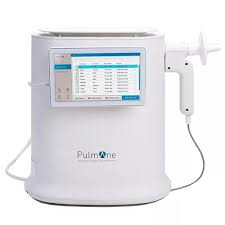Pulmonary Function Test

Our physician team uses the
PulmOne MiniBox™, an innovative measurement device for lung volumes and spirometry.
The phrase ‘pulmonary function test’ is an umbrella term for a group of tests that measure how well your lungs work. Pulmonary function tests can help your doctor determine the source of a breathing problem, to see how your condition is progressing or to evaluate the effectiveness of a treatment.
Why do I Need a Pulmonary Function Test?
Your doctor may recommend a pulmonary function test, or PFT, as part of a routine physical exam. A PFT can also help diagnose a health problem, such as:
- Allergies
- Respiratory infections
- Breathing problems resulting from an injury to the chest or a recent surgery
- Chronic lung conditions, such as asthma, chronic bronchitis or emphysema
- Asbestosis, a lung disease caused by inhaling asbestos fibers
- Scoliosis, which is curvature of the spine
- Tumors, inflammation or scarring of the chest wall
- Sarcoidosis, a disease that causes lumps of inflammatory cells around the lungs
- Scleroderma, a connective tissue disorder that thickens and scars lung tissue
Our pulmonologists perform PFTs to check lung function before surgery or surgical procedures, particularly for patients with heart or lung problems, who are smokers or who have other conditions. PFTs can also help doctors evaluate the effectiveness of treatment for asthma, emphysema and other chronic breathing problems.
What Does a PFT Measure
Pulmonary function tests determine how well your lungs take in and release air. They also help doctors understand how well your lungs move oxygen and other gases in and out of your body.
PFTs are non-invasive tests that measure lung volume, capacity, rate of flow, and gas exchange. Lung volume is the amount of air you inhale during normal breathing. Lung capacity is the amount of air you take in during a deep breath. Flow rates evaluate the air flowing in and out of your lungs. Gas exchange tests measure how well your lungs deliver oxygen to the bloodstream and remove carbon dioxide from it.
About the PFT Test Procedure
Our pulmonary team will give you specific instructions to prepare you for your pulmonary function test, but for best results do not eat a heavy meal before PFT and refrain from smoking for 4 to 6 hours before the test.
Your test may involve spirometry, which measures the amount of air you breathe in and out. You will wear a mouthpiece attached to a machine. You will also wear a nose clip to keep you from exhaling through your nose. The pulmonary specialist administering the test will tell you when to breathe quickly or take deep breaths. You may need to inhale certain medications.
You may feel dizzy after the test, but most patients tolerate PFT well.
Normal PFT values vary from person to person, so our pulmonary specialists will compare your results to the average results for someone about the same age, height, sex, and race as you. Doctors will also compare your newest PFT results with any previous pulmonary function tests you may have had in the past. If your PFT results are outside the normal range or if your results change, you may need other tests.
Contact Us about Pulmonary Function Testing
To learn more about pulmonary function testing and other diagnostic testing at O2 Pulmonary & Sleep Group call us at 214-919-0757 or contact us online.